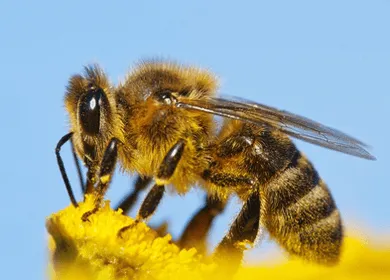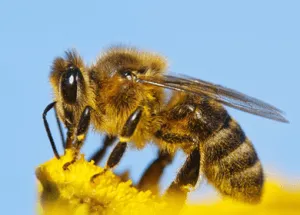
- Share on Facebook19
- Share on Pinterest
- Share on Twitter
Spring brings many beautiful things and also the beginning of weeks of suffering for those affected by seasonal allergies. The coughing, the sneezing, runny noses, scratchy eyes and throat that drive some people wild each year. Pollens spread by the wind are usually the main cause of seasonal allergies with early spring blooming trees being the main reason for Spring allergies. Some people are also sensitive to the grasses that start to bloom in early summer.Interestingly enough, researchers have found that bee pollen, especially fermented bee pollen is a beneficial treatment option for those who suffer from seasonal allergy symptoms.
Pollen is the male seed from flowers and is required for plant fertilization. Bee pollen is food for the young bee and contains about 40% protein. Collecting the pollen is a time consuming task for the bees. One teaspoon of bee pollen takes one bee a month to collect, working 8 hours a day.
Seasonal Allergy Relief
Research indicates that bee pollen can reduce or eliminate symptoms of seasonal allergies and hay fever. When small amounts of pollen are taken six weeks before the allergy season starts, as well as throughout the allergy season, allergy sufferers will experience desensitization. The body builds up antibodies that are necessary to keep the allergic reaction at bay. In addition to being effective for allergy sufferers, researchers have discovered a number of other amazing health benefits of this golden dust. Bee pollen contains a substance that inhibits the growth of harmful bacteria, may protect against radiation and even reduce cancer risk.
Complete Nutrition
 Bee pollen is truly a superfood and also known as buckwheat pollen, pine pollen and pu huang. It contains a plethora of nutrients and a mere 1 to 2 tablespoons is equal to a whole serving of vegetables, according to the American Apitherapy Society. The therapeutic benefits of bee pollen have been recognized for thousands of years. Rich in all of the B vitamins, bee pollen also offers vitamin E, vitamin A, vitamin C, folic acid, essential fatty acids, minerals and amino acids. Rutin, also known as vitamin P is found in bee pollen. This vitamin helps to strengthen the walls of blood cells and the capillaries.
Bee pollen is truly a superfood and also known as buckwheat pollen, pine pollen and pu huang. It contains a plethora of nutrients and a mere 1 to 2 tablespoons is equal to a whole serving of vegetables, according to the American Apitherapy Society. The therapeutic benefits of bee pollen have been recognized for thousands of years. Rich in all of the B vitamins, bee pollen also offers vitamin E, vitamin A, vitamin C, folic acid, essential fatty acids, minerals and amino acids. Rutin, also known as vitamin P is found in bee pollen. This vitamin helps to strengthen the walls of blood cells and the capillaries.
Bee’s Work Very Hard
Pollen is the male seed from flowers and is necessary for plant fertilization. Bee pollen is food for the young bee and contains about 40% protein. Collecting the pollen is a time consuming task for the bees. One teaspoon of bee pollen takes one bee a month to collect, working 8 hours a day. With the present bee crisis taking place, we should all respect and do what we can to keep the honey bees alive and thriving.
-The Alternative Daily
- Share on Facebook19
- Share on Pinterest
- Share on Twitter

